高中英语 Unit 1 Lifestyles Section Ⅴ Lesson 4教学案 北师大版必修1
- 格式:doc
- 大小:555.00 KB
- 文档页数:20
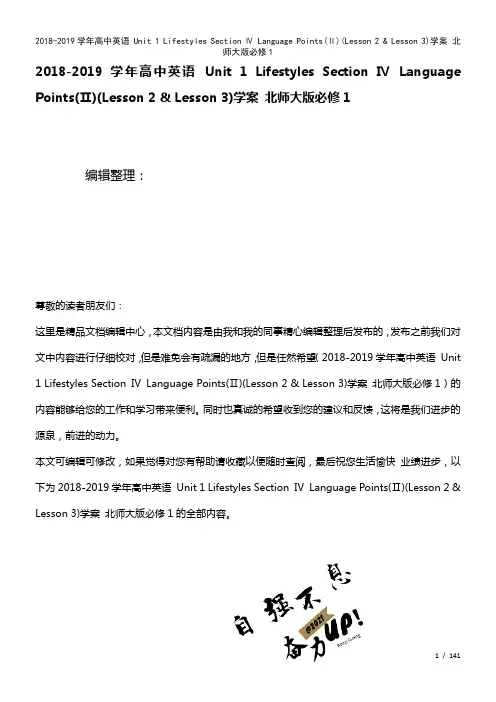
2018-2019学年高中英语Unit 1 Lifestyles Section ⅣLanguage Points(Ⅱ)(Lesson 2 & Lesson 3)学案北师大版必修1编辑整理:尊敬的读者朋友们:这里是精品文档编辑中心,本文档内容是由我和我的同事精心编辑整理后发布的,发布之前我们对文中内容进行仔细校对,但是难免会有疏漏的地方,但是任然希望(2018-2019学年高中英语Unit 1 Lifestyles Section ⅣLanguage Points(Ⅱ)(Lesson 2 & Lesson 3)学案北师大版必修1)的内容能够给您的工作和学习带来便利。
同时也真诚的希望收到您的建议和反馈,这将是我们进步的源泉,前进的动力。
本文可编辑可修改,如果觉得对您有帮助请收藏以便随时查阅,最后祝您生活愉快业绩进步,以下为2018-2019学年高中英语Unit 1 Lifestyles Section ⅣLanguage Points(Ⅱ)(Lesson 2 & Lesson 3)学案北师大版必修1的全部内容。
Sect ion ⅣLanguage Points(Ⅱ)( Lesson 2 & Lesson 3)[语言基础自测]Ⅰ.单词拼写根据汉语或首字母提示,写出下列单词1.Yuan Longping is an expert(专家) on agriculture。
2.I can’t stand(忍受) the noise。
Can you turn your radio down?3.Helen prefers(更喜欢) to stay at home rather than see a boring film。
4.My aunt has decided to have two meals a day to go on a diet(节食).She always complains about her weight。
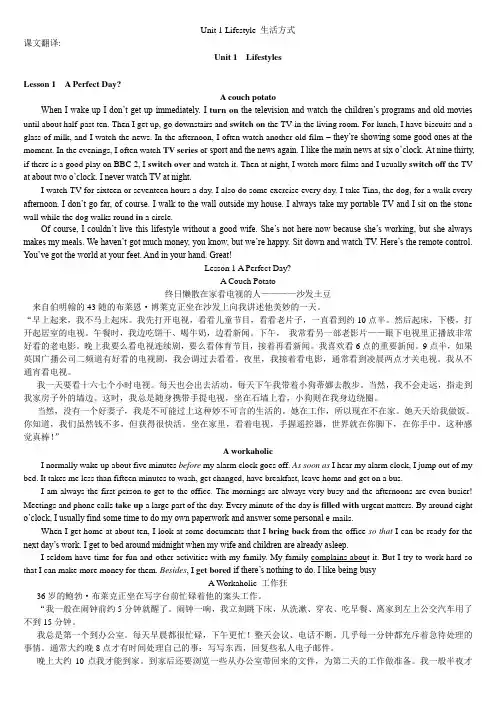
Unit 1 Lifestyle 生活方式课文翻译:Unit 1 LifestylesLesson 1 A Perfect Day?A couch potatoWhen I wake up I don’t get up immediately. I turn on the television and watch the children’s programs and old movies until about half-past ten. Then I get up, go downstairs and switch on the TV in the living room. For lunch, I have biscuits and a glass of milk, and I watch the news. In the afternoon, I often watch another old film –they’re showing some good ones at the moment. In the evenings, I often watch TV series o r sport and the news again. I like the main news at six o’clock. At nine thirty, if there is a good play on BBC 2, I switch over and watch it. Then at night, I watch more films and I usually switch off the TV at about two o’clock. I never watch TV at night.I watch TV for sixteen or seventeen hours a day. I also do some exercise every day. I take Tina, the dog, for a walk every afternoon. I don’t go far, of course. I walk to the wall outside my house. I always take my portable TV and I sit on the ston e wall while the dog walks round in a circle.Of course, I couldn’t live this lifestyle without a good wife. She’s not here now because she’s working, but she always makes my meals. We haven’t got much money, you know, but we’re happy. Sit down and watch TV. Here’s the remote control. You’ve got the world at your feet. And in your hand. Great!Lesson 1 A Perfect Day?A Couch Potato终日懒散在家看电视的人————沙发土豆来自伯明翰的43随的布莱恩·博莱克正坐在沙发上向我讲述他美妙的一天。
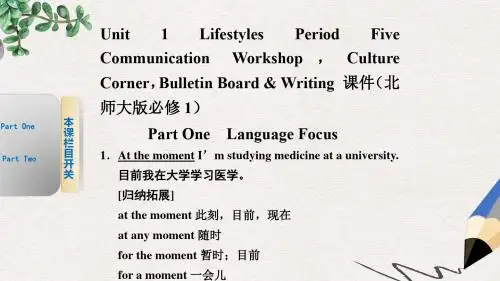
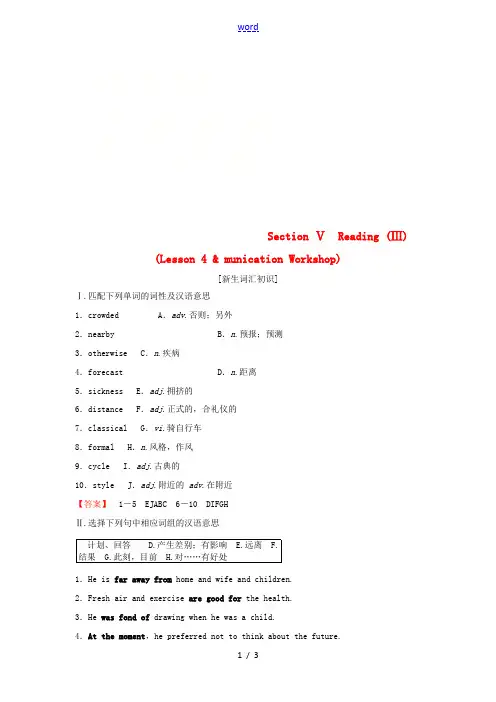
Section ⅤReading (Ⅲ) (Lesson 4 & munication Workshop)[新生词汇初识]Ⅰ.匹配下列单词的词性及汉语意思1.crowded A.adv.否则;另外2.nearby B.n.预报;预测3.otherwise C.n.疾病4.forecast D.n.距离5.sickness E.adj.拥挤的6.distance F.adj.正式的,合礼仪的7.classical G.vi.骑自行车8.formal H.n.风格,作风9.cycle I.adj.古典的10.style J.adj.附近的adv.在附近【答案】1-5 EJABC 6-10 DIFGHⅡ.选择下列句中相应词组的汉语意思计划、回答 D.产生差别;有影响 E.远离 F.结果G.此刻,目前H.对……有好处1.He is far away from home and wife and children.2.Fresh air and exercise are good for the health.3.He was fond of drawing when he was a child.4.At the moment,he preferred not to think about the future.5.As a result,costs will be reduced by as much as 90%.6.She es up with a solve solution to the problem.7.He would like to play a part in this historic process.8.Does his absence make a difference to your work?【答案】1-5 EHBGF 6-8 CAD[教材语篇细研]第一步速读——了解文章主题和段落大意速读P14-15教材课文,匹配段落大意1.Para.1 A.My evening activities.2.Para.2 B.My working conditions.3.Para.3 C.My weekend break.4.Para.4 D.Wakeup time and how to go to work.【答案】1-4 DBAC第二步细读——把控文章关键信息细读P14-15教材课文,选择最佳答案1.How long is it from Debbie's home to her pany?A.Fifty minutes' walk.B.Fifty minutes by underground.C.Fifty minutes by bus.2.Why doesn't Debbie like to go t o work on “the tube”?A.It's always too crowded.B.She is sometimes late if she goes to work on “the tube”.C.The underground is not fast enough.3.Debbie works for a French pany so she .A.has dance classes on Monday nightsB.goes to the gym on Wednesday nightsC.has French classes on Tuesday and Thursday nights4.When Paul's family take a weekend in London,.A.the children love looking in the clothes shopsB.the husband usually goes to the cinemaC.the wife likes to buy cigars5.From the second passage we know Paul is his life.A.unsatisfied withB.getting bored ofC.satisfied with【答案】1-5 BACBC第三步精读——能力升华接轨高考根据P14-15教材课文,在空白处填入1个适当的单词或括号内单词的正确形式Debbie is an accountant in a large pany in London.She often travels to work 1.by ually,it is so 2.crowded(crowd)that she can't find anywhere to sit.She often spends all morning 3.checking(check)numbers.For lunch she often gets a sandwich in a nearby sandwich shop.She often attends dance classes and goes to the gym in order to get enough exercise.At the weekend she sometimes drives to the countryside with her friends 4.if the weather forecast is good.Debbie and her friends like to go walking 5.where there are no shops,crowds or the tube.And the fresh air is so good for her lungs.She loves it.Paul lives in a small village in the north of England.He lives and works on the farm.There are many things to do on the farm all day.He works hard 6.to make(make)sure the cows,sheep,pigs and chickens on his farm are free of 7.sickness(sick).In the evening he likes to play with his children.Now he is studying Chinese by distance 8.learning(learn).When Paul and his family are in London,he likes to buy a few cigars.9.Unfortunately(fortunate),his wife isn't as fond of them as he is.His children love to ride on London's red buses and they 10.especially (especial)love to go on the tube!。
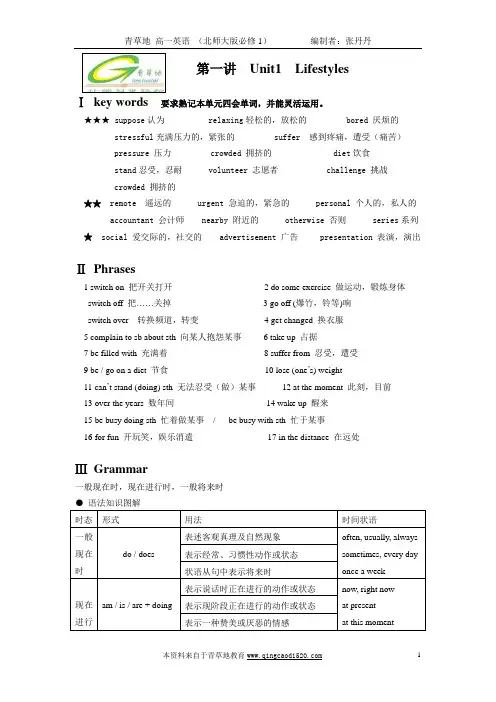
Ⅰkey words 要求熟记本单元四会单词,并能灵活运用。
★★★ suppose认为 relaxing轻松的,放松的 bored 厌烦的 stressful充满压力的,紧张的 suffer 感到疼痛,遭受(痛苦)pressure 压力 crowded 拥挤的 diet饮食stand忍受,忍耐 volunteer 志愿者 challenge 挑战crowded 拥挤的★★ remote 遥远的 urgent 急迫的,紧急的 personal 个人的,私人的 accountant 会计师 nearby 附近的 otherwise 否则 series系列★social 爱交际的,社交的 advertisement 广告 presentation 表演,演出ⅡPhrases1 switch on 把开关打开2 do some exercise 做运动,锻炼身体switch off 把……关掉 3 go off (爆竹,铃等)响switch over 转换频道,转变 4 get changed 换衣服5 complain to sb about sth 向某人抱怨某事6 take up 占据7 be filled with 充满着8 suffer from 忍受,遭受9 be / go on a diet 节食10 lose (one’s) weight11 can’t stand (doing) sth 无法忍受(做)某事12 at the moment 此刻,目前13 over the years 数年间14 wake up 醒来15 be busy doing sth 忙着做某事/ be busy with sth 忙于某事16 for fun 开玩笑,娱乐消遣17 in the distance 在远处ⅢGrammar一般现在时,现在进行时,一般将来时●语法知识图解●语法知识全解一、一般现在时的用法1)与常用时间状语连用Eg: 1 彼得每天早上六点钟起床。
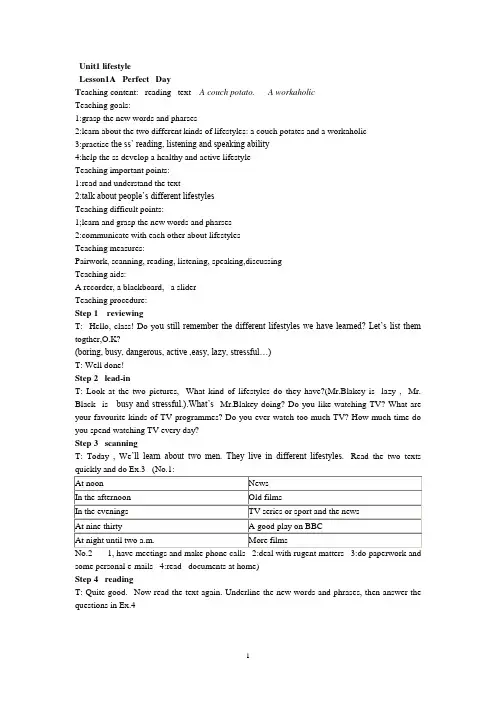
Unit1 lifestyleLesson1A Perfect DayT eaching content: reading text A couch potato. A workaholicTeaching goals:1:grasp the new words and pharses2:learn about the two different kinds of lifestyles: a couch potates and a workaholic3:practise the ss’ reading, listening and speaking ability4:help the ss develop a healthy and active lifestyleTeaching important points:1:read and understand the text2:talk about people’s different lifestylesTeaching difficult points:1;learn and grasp the new words and pharses2:communicate with each other about lifestylesTeaching measures:Pairwork, scanning, reading, listening, speaking,discussingTeaching aids:A recorder, a blackboard, a sliderTeaching procedure:Step 1 reviewingT: Hello, class! Do yo u still remember the different lifestyles we have learned? Let’s list them togther,O.K?(boring, busy, dangerous, active ,easy, lazy, stressful…)T: Well done!Step 2 lead-inT: Look at the two pictures, What kind of lifestyles do they have?(Mr.Blakey is lazy , Mr. Black is busy and stressful.).What’s Mr.Blakey doing? Do you like watching TV? What are your favourite kinds of TV programmes? Do you ever watch too much TV? How much time do you spend watching TV every day?Step 3 scanningT: Today , We’ll learn about two men. They live in different lifestyles.Read the two textssome personal e-mails 4:read documents at home)Step 4 readingT: Quite good. Now read the text again. Underline the new words and phrases, then answer the questions in Ex.4(Suggested answers: No.1: Brian do nothing but watch TV for 16-17hours and his wife makes money and prepares meals for him. No2: You know everything happening in the world and feel powerful and successful)Step 5 language learning1: switch on : turn onSwitch the TV on quickly, the game will be on TV soon2: switch off: turn offBefore leaving, you should switch the tap off.3:switch over: change the channels from one to another.The programme OUTLOOK is on TV. Let’s switch it over to Chaanel 9.4:be filled with; be full of5:take up: cover,occupy Playing football takes up most of his time6:get changed; change one’s clothes7:make one’s way through:do sth.. from the beginning to the endI have been sitting , making my way through my lesson for hoursT: Let’s do Ex.7complete the sentence below in the correct form . After that we’ll play the tape for you to listen and then I’ll get some ss to read the text alou d.Step 6: consolidationT: We’ve learned Mr. Blakey and Mr. Black’s routine work. Do you think if their lifestyles are healthy? What can they do to improve their lifestyles? Discuss and then share your opinions with class.(For Brain he should spend less time on TV. First , he should get up soon after waking up and do morning exercises. Second ,he should try to find a job and go to work every day.. For Bob , he should sleep later every morning. He should eat a big breakfast and be more relaxed. He should also sleep earlier every night, and spend more time with his family. )T: Well, let’s go on to another topic . Ask your partner what he or she do at different time in a day, and decide wheather your partner is a couch potato or a workaholic? Use the following samples: What do you do at …?Step 7 homework1:Review new words and phrases2:Do the Ex. 10 describe your parents’ lifestyles to your partner by working in pairs Blackboard DesignLesson 1 A Perfect Day?1: switch on : turn on 2: switch off: turn off3:switch over: change the channels from one to another.4:be filled with; be full of 5:take up: cover,occupy6:get changed; change one’s clothes7:make one’s way through: do sth.. from the beginning to the endLesson 2 RelaxingTeaching aims:To practise listening for specific informationTo learn about ways of dealing with stress in everyday lifeTeaching course:Ⅰ Warm upWork is very important in our life. We have to work, no matter what you are. With the development of modern society, people are fastening their steps of life. There is less time for relaxation. The problem is that more and more people feel stressed. How to get rid of the stress we are suffering from is what we are to talk about.Ⅱ TalkingTask oneYou are to do some listening, Before it think about your school life, list the things ( at least 3 ) you do and your feeling about them.How do you get rid of the stress in your life?Talk to each other about the activities you have listed. Say which is stressful and which is relaxing. Do it like this:prepare for an exam; lie on the beach; wait for the result of; give a talk in English; do shopping with task two.Interview your classmates to see what kind of stress they are suffering from and how they relax themselves or get rid of it.ⅢListeningDo the exercise 2Do the exercise 3Read through the Strategies with the class and see if they can use any of these Strategies already. In pairs, students read the questions and try to predict the answers. Point out that morethan one answer is possible.Students then exchange ideas to find out if they have made the same predictions if they have made different predictions, ask students to justify their opinions.Do the exercise 5 and 6Before listening the materials ask students to read the questions and first predict answers then listen the tape twice.When students have checked their answers, ask them what advice they would give to Mark to help him be less nervous before exams and before going to parties.Do the exercise 7Students look at the exercise and see if they can remember or can guess any of the missing words. Students listen to the cassette again and complete the sentences in the Function File. PronunciationDo the exercise 9In our oral language we often pause. Now listen to Mark again. Which words or sounds does he use to hesitate?Students listen to the cassette. After each sentence, pause the cassette so that students can repeat the hesitation device.Do the exercise 10Before starting their talk, students can look at the sentences they wrote in Exercise 9Students then put the exercise away and talk to their group without any notes, using as many hesitation words as possible.Ⅳ Homework:Writ a report about you interview in class. Write about the stress you and most of your classmates are suffering from. Find the causes of the stresses and give advice on how to relax yourselves.Lesson 3 A Volunteer TeacherTeaching aims:To listen for specific factsTo give opinion about voluntary workTo talk about future arrangements and intentions, using the Present Simple, the Present Continuous and going toTeaching difficulties:To talk about future arrangements and intentions, using the Present Simple, the Present Continuous and going toTeaching Aids: computer and cassetteTeaching procedures:Ⅰ. SpeakingT: What does the girl do?S:T: Yes she is a volunteer teacher. T his is a real story. The girl’s name is Wang Shu, grew up in Hangzhou, Zhejiang Province. Upon graduation from the English department of Beijing Normal University, she left Beijing for Inner Mongolia working as a volunteer teacher. She is still there now. What do you know about this part of China?S:T: show a slide to introduce Inner Mongolia (Inner Mongolia (Nei Mongol) is the first national autonomous region established in China. It stretches along China's northern border with Mongolia and Russia and covers an oblong area of over 1.28 million square kilometers, one eighth of China. Of all the Chinese provinces and autonomous regions, Inner Mongolia is the third largest after Xinjiang and Tibet.) Inner Mongolia falls behind developed areas so it needs volunteers go to work there.T: What can you say about the girl in the photo?S:Ⅱ ListeningStudents read the questions and predict the answersT: I think you must be interested in Wang Shu, now listen to the interview, you will learn more about her and answer these questions.Students listen to the tape and check their predictions.Students listen to the tape again and make sure of the answersStudents work in pairs and take turns to retell Wang Shu’s storyⅢ Voice your opinionIs it a good idea to do voluntary work? What reasons do people have for doing voluntary work?Ⅳ VocabularyDo the exercise 5.Students work individually, thinking about the cues and what they are going to do.Students read the sentences, decide which words to use, and then complete the sentences. Translate sentences1.我们要两点半出发。

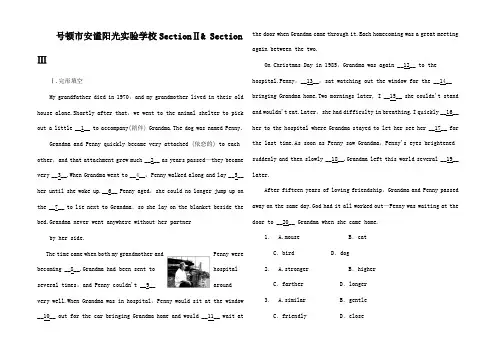
号顿市安谧阳光实验学校SectionⅡ& Section ⅢⅠ.完形填空My grandfather died in 1970,and my grandmother lived in their old house alone.Shortly after that,we went to the animal shelter to pick out a little __1__ to accompany(陪伴) Grandma.The dog was named Penny.Grandma and Penny quickly became very attached (依恋的) to each other,and that attachment grew much __2__ as years passed —they became very __3__.When Grandma went to __4__,Penny walked along and lay __5__ her until she woke up.__6__ Penny aged,she could no longer jump up on the __7__ to lie next to Grandma,so she lay on the blanket beside the bed.Grandma never went anywhere without her partnerby her side.The time came when both my grandmother and Penny were becoming __8__.Grandma had been sent to hospital several times,and Penny couldn't __9__ around very well.When Grandma was in hospital,Penny would sit at the window __10__ out for the car bringing Grandma home and would __11__ wait at the door when Grandma came through it.Each homecoming was a great meeting again between the two.On Christmas Day in 1985,Grandma was again __12__ to the hospital.Penny,__13__,sat watching out the window for the __14__ bringing Grandma home.Two mornings later, I __15__ she couldn't stand and wouldn't ter,she had difficulty in breathing.I quickly __16__ her to the hospital where Grandma stayed to let her see her __17__ for the last time.As soon as Penny saw Grandma,Penny's eyes brightened suddenly and then slowly __18__.Grandma left this world several __19__ later.After fifteen years of loving friendship,Grandma and Penny passed away on the same day.God had it all worked out—Penny was waiting at the door to __20__ Grandma when she came home.1. A.mouse B.catC.bird D.dog2. A.stronger B.higherC.farther D.longer3. A.similar B.gentleC.friendly D.close4. A.work B.hospitalC.sleep D.church5. A.on B.besideC.under D.below6. A.Since B.WhileC.As D.Though7. A.table B.bedC.chair D.blanket8. A.lost B.activeC.weak D.tired9. A.show B.walkC.play D.jump10.A.looking B.cryingC.climbing D.getting11.A.worriedly B.hurriedly C.excitedly D.disappointedly 12.A.invited B.takenC.led D.moved13.A.as usual B.in timeC.by accident D.at once14.A.car B.truckC.bus D.bicycle15.A.believed B.guessedC.heard D.found16.A.guided B.postedC.sent D.followed17.A.owner B.motherC.doctor D.saver18.A.opened B.brightenedC.closed D.wetted19.A.hours B.daysC.weeks D.months20.A.call B.helpC.miss D.greetⅡ.阅读理解AA thirteen year old boy from California has become the youngest person ever to climb to the top of Mount Everest(珠穆朗玛峰)as part ofhis goal to climb the highest mountains on all seven continents.At all of 13 years old,Jordan Romero,from Big Bear,California,has already climbed to the top of Kilimanjaro in Africa and has prepared for Mount Everest since then.On Saturday 22nd May,2010 Jordan reached the 29,035foot top,his spokesperson told the Associated Press(美联社)via a satellite phone.On Jordan's blog earlier in the day he'd said,“Every step I take is finally toward the biggest goal of my life,to stand on the top of the world”,and a statement on the blog from his spokesperson said that after theyreached the summit “everyone sounded unbelievablyhappy”.Jordan Romero has been climbing the highest mountains in the world with his father and three guides.His mother watched them via GPS at home.“I'm just very proud of him,”she said in a telephone interview with the Associated Press.Jordan's achievement has been hailed by well wishers around the world,including the famous sports website that celebrated his Kilimanjaro climb in 2006 as an example to other children “to get their own amazing achievements”.The old record was held by Temba Sheri of Nepal who climbed to the top of the mountain in 2001,at age 16.Ambitious(雄心勃勃的)teenagers have become the source of some disagreements in recent months as questions are raised about the physical and mental health(身心健康)of children when trying to take an adventure to make a record.1.Jordan's desire is to climb ________.A.the highest mountains in the USAB.the highest mountains on all seven continentsC.the steepest mountains all over the worldD.one of the highest mountains in the world2.The underlined word “hailed” in Paragraph 5 probably means “________”.A.understood B.doubtedC.tried D.cheered3.Which of the following can be inferred from this passage?A.People had different attitudes towards Jordan's adventure.B.Jordan's parents didn't support Jordan in achieving his goal.C. is one of the websites about climbing mountains.D.The media paid little attention to Jordan's adventure.4.What Jordan Romero's story impresses us most is the fact that ________.A.he has so strong a will that he never gives inB.he has great determination to conquer all the highest mountains C.he is the youngest person on the highest mountainsD.he is so lucky to travel all over the worldBFor many years,people in American cities have depended on farmers in rural areas to grow fruits and vegetables.But now a new generation of farmers is planting crops in urban areas.Sean Conroe is a college student.Amber Banks is a teacher.They were both engaged in(忙于……)farming and gardening.Sean Conroe and Amber Banks wanted to start a farm in the middle of Seattle,Washington.“There are a lot of neighborhoods that don't have access to healthy and fresh produce.And if they do,it can be very expensive.So we see unused space as a great place to grow food that will make it more accessible to people.”Says Amber Banks.Sean Conroe created a website to get volunteers and donations.Within a week,they were offered a plot of land between two houses.He says twenty volunteers worked for six weekends to turn the grassy land into a farm.They call their project Alleycat Acres.The Alleycats have harvested about ninety kilograms of produce so far.They have donated most of it to local food banks that feed hungry people in Seattle.Bridget Barni is sitting in the dirt picking lettuce(生菜).She is one of eighty people who are volunteering at this urban farm.Like a lot of the volunteers,she does not have much gardening experience.One of the goals of the urban farm is to show city people the joy of growing food.The Alleycats invite school groups to the farm to help out.And Amber Banks says they want the same people who get food donations to learn how to work the soil.Sean Conroe says the Alleycats are expanding to other empty areas of Seattle.So are a lot of other urban farming groups.5.What is the text mainly about?A.An urban farming group.B.Urban people's way of getting vegetables.C.The early promoters(创办人)of urban farming.D.Farm produce in America.6.Sean Conroe created a website to ________.A.spread the knowledge of urban farmingB.get workers and the land they needC.collect food for hungry peopleD.promote his project7.What do we know about Bridget Barni?A.She is an expert with a lot of gardening experience. B.She is one of the founders of the Alleycats.C.She is a volunteer with little gardening experience. D.She is doing all the hard work in the Alleycats.8.The last paragraph suggests that ________.A.it is easy for city people to experience the joy of farming B.the Alleycats will have great difficulty in expanding C.Amber Banks wants people to help her outD.the organization is also welcomed in other parts of Seattle 详解答案Ⅰ.2.选A 根据下文Penny时刻陪伴奶奶可知,她们之间的依恋变得越来越强烈了。
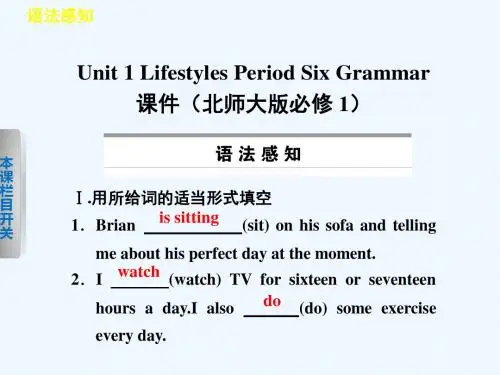
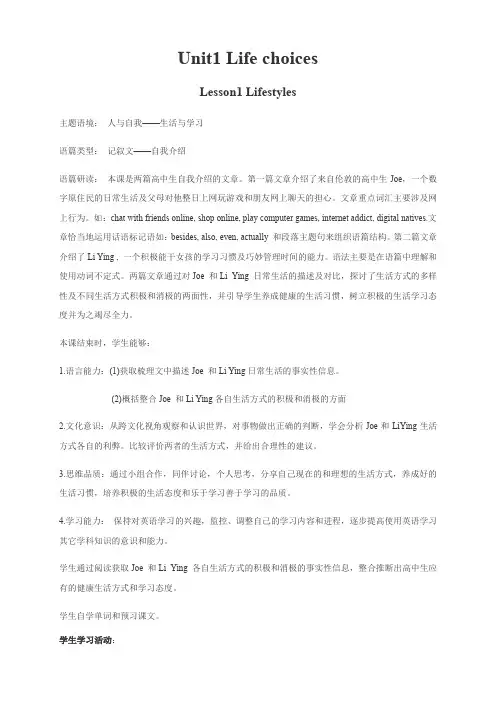
Unit1 Life choicesLesson1 Lifestyles主题语境:人与自我——生活与学习语篇类型:记叙文——自我介绍语篇研读:本课是两篇高中生自我介绍的文章。
第一篇文章介绍了来自伦敦的高中生Joe,一个数字原住民的日常生活及父母对他整日上网玩游戏和朋友网上聊天的担心。
文章重点词汇主要涉及网上行为。
如:chat with friends online, shop online, play computer games, internet addict, digital natives.文章恰当地运用话语标记语如:besides, also, even, actually 和段落主题句来组织语篇结构。
第二篇文章介绍了Li Ying , 一个积极能干女孩的学习习惯及巧妙管理时间的能力。
语法主要是在语篇中理解和使用动词不定式。
两篇文章通过对Joe 和Li Ying 日常生活的描述及对比,探讨了生活方式的多样性及不同生活方式积极和消极的两面性,并引导学生养成健康的生活习惯,树立积极的生活学习态度并为之竭尽全力。
本课结束时,学生能够:1.语言能力:(1)获取梳理文中描述Joe 和Li Ying日常生活的事实性信息。
(2)概括整合Joe 和Li Ying各自生活方式的积极和消极的方面2.文化意识:从跨文化视角观察和认识世界,对事物做出正确的判断,学会分析Joe和LiYing生活方式各自的利弊。
比较评价两者的生活方式,并给出合理性的建议。
3.思维品质:通过小组合作,同伴讨论,个人思考,分享自己现在的和理想的生活方式,养成好的生活习惯,培养积极的生活态度和乐于学习善于学习的品质。
4.学习能力:保持对英语学习的兴趣,监控、调整自己的学习内容和进程,逐步提高使用英语学习其它学科知识的意识和能力。
学生通过阅读获取Joe 和Li Ying 各自生活方式的积极和消极的事实性信息,整合推断出高中生应有的健康生活方式和学习态度。
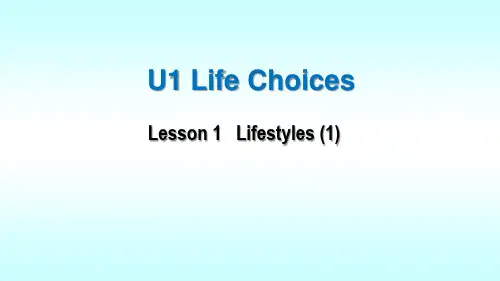
高中英语学习材料***鼎尚图文理制作***UNIT 1 LifestylesⅠ学习目标单词Warm -upboring, relaxing, stressful, peaceful, active, interesting, dangerous, exciting Lesson 1sports programmes, TV series, cartoons, game showsLesson 2stress, studio, expert, pressure, social, reduce, organise, prefer, stand Lesson 3support, solve, design, volunteer, challenge, advertisement, presentation Lesson 4accountant, crowded, career, otherwise, nearbyCommunication Workshopclassical, formal, style, cycle短语Warm-uponce a week, in one's free timeLesson 1switch on/off/over, go off, take up, be filled with, complain aboutLesson 2suffer fromLesson 3graduate from, be excited about, make a decision, be prepared for, meet challenges, to tell the truth, have a long talk, win one's support, be proud of, solve problems Lesson 4distance learning, music fan, weather forecastCommunication Workshopat the moment, over the years句型I think... but...I find... very...I prefer/like/enjoy... because...I can't stand...交际用语All the best.Can you give me...?How about...?Why don't you...?语法一般现在时和现在进行时一般将来时will,be going to及一般现在时表示将来Ⅱ质量检测形成性检测一、词组互译A.英译汉:1.once a week ________________ 2.graduate from________________ 3.meet challenges ________________ 4.win one's support________________ 5.solve problems ________________ 6.complain about________________ 7.make a decision ________________ 8.to tell the truth________________ 9.be proud of ________________ 10.be prepared for________________ B.汉译英:1.转换频道,转变________________ 2.忍受,遭受________________3.数年间________________ 4.占据________________5.把……关上________________ 6.充满着________________7.此刻、目前________________ 8.(爆竹、铃等)响________________ 9.终日懒散在家的人________________ 10.把……打开、接通________________ 二、用括号里词语的适当形式填空1.He really can't stand the ________ speech. (tire)2.At last, they ________ the problem successfully. (solve)3.She finds her new teaching job very ________ (stress)4.A group of ________ are studying on the damage caused by the earthquake. (expert) 5.Every student is eager to have a ________ holiday. (relax)6.Before Christmas, the supermarket was ________ with shoppers. (crowd)7.We can see the mountain from the ________ (distant)8.Finally, she made the ________ to study abroad. (decide)9.Li Ming is lucky enough to become one of the ________ for Beijing Olympic Games.(volunteer)10.What is your plan for the ________ weekend?(come)三、单项选择1.— Hi, Lily. I've read your latest book. It's really wonderful!— I'm glad you like it.—What's your new plan?—I ________ another book about animals next month.A.am going to write B.wroteC.am writing D.have written2.—I think being a basketball player is really exciting.—Yes, ________ sometimes it is very________.A.but... interesting B.and... interestedC.and... stressful D.but... stressful3.Having a wonderful holiday can make people________.A.relaxing B.to be relaxed C.relaxed D.to relax4.Mary always ________ to me ________ her roommate.A.complained... about B.complained... toC.complains... about D.complains... to5.—By the way, what's the time now?— Half past nine.—Please get everything ready. Mr. Black ________ at any time.A.has arrived B.is arriving C.arrive D.arrived6.When his parents came back home, they found ________ reading the book carefully.A.he B.his C.him D.himself 7.—How ________ you ________ on with your classmates now?—Quite well.A.will...get B.do... get C.did... get D.are... getting 8.—What's Tom's hobby?—Tom, as well as his brothers, ________ making models very much.A.likes B.like C.is liking D.are liking9.—I haven't seen Mr. Lee for a long time. What's he doing?—He is busy preparing for the coming test________.A.in a moment B.at the moment C.for the moment D.for a moment 10.I ________ the dictation when you ________ ready.A.will begin, were B.begin, wereC.will begin, are D.begin, are11.He is in poor health and he suffers ________ from it.A.a few B.many C.a little D.a lot12.—Did you attend the speech?—Yes, but I was ________ by the ________ speech.A.boring, boring B.bored, boring C.boring, bored D.bored, bored 13.—Where is Mrs. White?—She ________ and left five minutes ago.A.gets dressed B.puts on C.got dressed D.put on 14.—What do you think of your English study?— It's OK, but sometimes ________ difficult for me to keep up with the others in my class.A.that is B.this is C.one is D.it is15.Mr. White ________ a job as an engineer twenty years ago.A.took on B.took down C.took off D.took up四、完形填空Man has a big brain. He can 1 , learn and speak. Scientists used to think that men are 2 from animals because they can think and learn. They know now that animals can learn—dogs, rats, birds—and worms—can learn. So scientists are 3 to understand that men are different from animals because they can 4 Animals cannot speak. They make 5 when they are afraid, or angry, or unhappy. Apes (猿) are our nearest 6 They can understand some things more quickly than human beings, and one or two have learned a few 7 But they are 8 different from us. They cannot join words and 9 sentences. They cannot think like us because they have no language. They can never think about the past or the 10 Language is a wonderful thing. Man has been able to develop civilization ( 文明) because he has language. Every 11 can speak his own language very 12 when he is four or five—but 13 animal learns to speak. How do children learn?Scientists do not really know. What happens when we speak? Scientists do not know. They 14 know that man can speak because he has a big 15 .1.A.think B.act C.move D.see2.A.away B.separated C.free D.different 3.A.trying B.beginning C.intending D.getting 4.A.speak B.tell C.say D.talk5.A.voice B.cry C.a whistle D.a noise 6.A.humans B.brothers C.cousins D.friends 7.A.things B.numbers C.skills D.letters 8.A.already B.yet C.still D.quite 9.A.invent B.tell C.find D.make 10.A.future B.surroundings C.enemies D.dangers 11.A.person B.boy C.girl D.child 12.A.wonderful B.well C.clearly D.beautifully 13.A.no B.few C.such D.seldom 14.A.really B.only C.usually D.actually 15.A.head B.brain C.body D.luck五、阅读理解AOn June 17, 1774, the officials from Maryland and Virginia held a talk with the Indians of the Six Nations. The Indians were invited to send boys to William and Mary College. In a letter the next day they refused the offer as follows:We know that you have a high opinion of the kind of learning taught in your colleges, and that the costs of living of our young men, while with you, would be very expensive to you. We are convinced that you mean to do us good by your proposal (提议, 建议); and we thank you heartily. But you must know that different nations have different ways of looking at things, and you will therefore not be offended if our ideas of this kind of education happen not to be the same as yours. We have had some experience of it. Several of our young people were formerly brought up at the college of the northern provinces: they were taught all your sciences; but when they came back to us, they were bad manners, ignorant (无知的, 愚昧的) of every means of living in the woods —they were totally good for nothing.We are, however, not the less obliged (使感激) by your kind offer, though we refuse to accept it; and, to show our grateful sense of it, if the gentlemen of Virginia will send us a dozen of their sons, we will take care of their education, teach them all we know, and make men of them. 1.The passage is about________.A.the talk between the Indians and the officialsB.the colleges of the northern provincesC.the educational values of the IndiansD.the problems of the Americans in the mid -eighteen century2.The Indian chief' s purpose of writing the letter seems to be to________.A.politely refuse a friendly offerB.express their opinions on equal treatmentC.show their prideD.describe Indian customs3.According to the letter, the Indians believed that________.A.it would be better for their boys to receive some schoolingB.they were being insulted (侮辱, 辱骂) by the offerC.they knew more about science than the officialsD.they had better way of educating young men4.Different from the officials' view of education, the Indians thought________.A.young women should also be educatedB.they had different goals of educationC.they taught different branches of scienceD.they should teach the sons of the officials firstB阅读短文,根据要求回答问题。
高中英语 Unit 1 Lifestyles Period One Warm up Reading同步测试1 北师大版必修1Period One Warmup & Reading(Ⅰ)基础落实Ⅰ.课文理解1.The first thing Brian does when he wakes up is ______.A.to get upB.to wash and get changedC.to turn on the TV2.What kind of TV program does Brian watch over lunch?A.Children’s program.B.News.C.TV series.3.When does Brian usually switch off his TV?A.At 10 o’clock.B.At 12 o’clock.C.At 2 o’clock in the morning.4.Why can he live such a relaxing life?A.He has a good wife.B.He is single.C.He is very rich.5.What does Bob’s family complain about?A.Bob’s laziness.B.Bob’s low income.C.He seldom has time for activities with his family.Ⅱ.课文缩写A Couch PotatoWhen Brain Blakey wakes up,he doesn’t get up 1.________(immediate).He turns 2.________ the television and watches 3.________ until about halfpast ten.Then he goes downstairs and switches on the TV in the living room.He watches TV all day and 4.________ there is a good play on BBC 2,he switches over and watches it.He usually switches off the TV at about two o’clock.He also takes Tina,the dog,for 5.________ walk every afternoon,but doesn’tgo far.He always takes his portable TV and watches it on the stone wall.He lives this lifestyle because he has a good wife.Here’s the remote control.He has got the world at his feet!Great!A WorkaholicBob Black is sitting at his desk and 6.________(work) his way through his paperwork.He always gets up early and is always the first person 7.________(get) to the office.He is very busy all day.Every minute of the day 8.________(fill) with urgent matters.By around eight o’clock,he usually finds some time to do his own paperwork and answers some personal emails.When he gets home,he looks at some documents 9.________ he brings back from the office so that he ca n be ready 10.________ the next day’s work.He seldom has time for fun.His family complains about it.But he likes being busy.Ⅲ.用适当的介、副词填空1.I turn ________ the television and watch the children’s programmes and old movies ________ about halfpast ten.2.________ the evenings,I often watch TV series or sport and the news again. 3.At nine thirty,if there is a good play ________ BBC 2,I switch ________ and watch it.4.I take Tina,the dog,________ a walk every afternoon.5.Of course,I couldn’t live this lifesty le ________ a good wife.6.I normally wake up ________ five minutes before my alarm clock goes ________. 7.Meetings and phone calls take ________ a large part of the day.8.________ around eight o’clock,I usually find some time to do my own paperwork and a nswer some personal emails.9.I seldom have time ________ fun and other activities ________ my family. 10.My family complains ________ it.Ⅳ.用课文中的词语替换划线部分1.I was angry,and I asked to see the manager right_away.__________2.Turn_off the lights when you are not in a room.__________3.She changed_her_dress before she left.__________4.This table occupies too much room.__________5.Of course,I’ll do some reading for_pleasure,and for knowledge as well.__________ Ⅴ.完成句子1.I won’t give you any answer ________________________(直到我对此事仔细考虑后).2.Some are rich ________________________(有些人却很穷).3.______________________________(十年树木) but a hundred years to educate people.4.He is always ________________________(第一个到) and the last to leave.5.She worked hard __________(以便) everything would be ready in time.能力提升阅读理解Moving in with a boyfriend causes women to eat more unhealthily and put on weight.But the opposite is true for men,whose longterm health benefits when they move in with a female partner.Dieticians at Newcastle University said both partners try to please one another,and so change their dietary habits to suit their other half.It leads men to eat more light meals,such as salads,fruit and vegetables,while women choose to make creamier,heavier dishes curry or rich pasta sauces,which may please their partner.Women still have the strongest longterm influence over the couple’s diet and lifestyle,as they still have the traditional role of shopper and cook in most households.The report,by Newcastle University’s Human Nutrition Research Centre,reviewed the finding of a variety of research projects from the UK,North America and Australia,which looked at the eating and lifestyle habits of couples.The research shows that women are more likely to put on weight and increase their consumption of foods high in fat and sugar when they move in with their partner.Women also use food as a comfort when dealing with emotional stress and have been found to gain weight when a relationship ends,while the same finding has not been observed in men.Many couples reported food as being central to their partnership,and eating together in the evening was particularly important to many.Report author and registered dietician Dr.Amelia Lake said,“The research hasshown that your partner is a strong influence on lifestyle and people who are trying to live healthier lives should take this factor into consideration.”1.According to the passage,moving in with a girlfriend,men ________.A.have few changes of their dietary habitsB.have to eat more unhealthy foodsC.don’t like foods high in fat and sugar at allD.try to eat foods that their girlfriends like2.The underlined word “light” in Paragraph 3 probably means “________”.A.not very heavyB.less in fat and sugarC.gentleD.not serious or important3.According to the report by Newcastle University’s Human Nutrition Research Centre,________.A.women put on weight only because they want to suit their other halfB.when men are faced with emotional stress,they will change their dietary habits C.eating together in the evening is a good way to communicate for couples D.it is wrong to change your dietary habits to suit your partner4.From the passage,we can infer that ________.A.women should pay more attention to their partn er’s influence on themB.more men will play roles of shopper and cook in most householdsC.couples will not change their dietary habits and lifestyle to please their partnerD.longterm health of men benefits when they move in with a female partner 5.What would be the best title for the passage?A.Don’t Be Silly Any More,Women!B.Which Are Better Dietary Habits?C.Boyfriends Make You FatD.Dr.Amelia Lake and His Study答案基础落实Ⅰ.1.C 2.B 3.C 4.A 5.CⅡ.1.immediately 2.on 3.it 4.if 5.a 6.working 7.to get 8.is filled 9.that 10.forⅢ.1.on until 2.In 3.on over 4.for 5.without 6.about off 7.up8.By 9.for with 10.aboutⅣ.1.immediately 2.Switch off 3.got changed 4.takes up 5.for funⅤ.1.until I have thought it over 2.while others are poor 3.It takes ten years to grow trees 4.the first to come 5.so that能力提升1.D 2.B 3.C 4.A 5.C。
Unit 1 Lesson1 a篇课文讲解及句子成分分析一.课文及翻译:I ' m a digital native !我是数字原住民!I ' m Joe , a student from London .You ' ll often find me sitting in front of my laptop .我是乔,一名来自伦敦的学生。
你经常会发现我坐在笔记本电脑前。
The online world is a big part of my life . I ' m a " digital native " I ' ve been using the puter since I was a kid .网络世界是我生活的重要组成部分。
我是一个“数字原住民”——我从小就开始使用电脑。
I do a wide range of things online .我在网上做各种各样的事情。
Besides doing all my schoolwork , I chat with my friends , watch films and read the daily news and other interesting articles ;除了完成所有的学校作业外,我还和朋友们聊天、看电影、阅读每日新闻和其他有趣的文章;I also shop for various things online , such as books , puter hardware and other necessities .我还在网上购买各种东西,比如书籍、电脑硬件和其他必需品。
It ' s so convenient to be able to pare the quality and prices from different online shops before I buy .在购买之前,能够比较不同网店的质量和价格真是太方便了。
Section Ⅴ Lesson 4[原文呈现]Debbie is an accountant①in a large company in the centre of London.I need to be in my office by② nine o’clock so I usually get up at seven o’clock. I travel to work on “the tube③”. That’s what people call the underground in London④. It takes about fifty minutes.⑤ Usually, it’s so crowded⑥ that I can’t find anywhere to sit⑦.I just stand. I’m always tired⑧ before I arrive at work.I don’t like the underground!I spend all morning checking numbers.⑨ Lunch is always simple. I often get a sandwich in a nearby⑩sandwich shop or I just have some biscuits and a cup of coffee. Then in the afternoon, I return⑪ to the paperwork in the office.[读文清障]①accountant/ə'kaʊntənt/n.会计,会计师②by prep.到……为止③tube/tjuːb/n.(英)地铁④what引导表语从句,并在从句中作call的宾语。
⑤It takes ... (to do sth.)(做某事)花费……⑥crowded/'kraʊdId/adj.拥挤的⑦so ... that ...句式,表示“如此……以至于……”。
高中英语必修1〔北师大版〕Unit 1 Lifestyles知识点总结一、重点词汇lifestyle·原文再现Talk about your own lifestyle, and find out about other people's.谈论你自己的生活方式,并了解别人的生活方式。
·根本用法lifestyle n. 生活方式;生活时尚You should throw over your lifestyle.你应该改变你的生活方式。
My healthy lifestyles help me get good grades.我安康的生活方式帮我去得好成绩。
peaceful·根本用法peaceful adj. 和平的,爱好和平的;平静的China is a peaceful country and Chinese people are very friendly.中国是一个爱好和平的国家,中国人民都很友好。
注:"n+ful〞构成形容词peace(n.)和平;平静----peaceful(adj.)和平的;平静的stress(n.)压力-----stressful (adj.)有压力的The distant country is so peaceful that I don’t want to go back to the noisy city.遥远的乡村如此宁静以至于我不想返回喧闹的城市。
It was a very stressful time for all of them.对于他们所有的人来说,那时一段困难时期。
·知识拓展相关单词peacen.和平,宁静;平和peacefully adv.和平地;安静地相关短语in peace 处于和平的状态;平静地He can't live in peace with his neighbors.他不能和他的邻居和平共处。
Section Ⅴ Lesson 4[原文呈现]Debbie is an accountant①in a large company in the centre of London.I need to be in my office by② nine o’clock so I usually get up at seven o’clock. I travel to work on “the tube③”. That’s what people call the underground in London④. It takes about fifty minutes.⑤ Usually, it’s so crowded⑥ that I can’t find anywhere to sit⑦.I just stand. I’m always tired⑧ before I arrive at work.I don’t like the underground!I spend all morning checking numbers.⑨ Lunch is always simple. I often get a sandwich in a nearby⑩sandwich shop or I just have some biscuits and a cup of coffee. Then in the afternoon, I return⑪ to the paperwork in the office.[读文清障]①accountant/ə'kaʊntənt/n.会计,会计师②by prep.到……为止③tube/tjuːb/n.(英)地铁④what引导表语从句,并在从句中作call的宾语。
⑤It takes ... (to do sth.)(做某事)花费……⑥crowded/'kraʊdId/adj.拥挤的⑦so ... that ...句式,表示“如此……以至于……”。
⑧be tired感到劳累be tired out非常疲倦(=very tired)be tired with sth.因某事而劳累be tired of doing sth. 厌倦做某事⑨Sb. spend(s) time (in) doing sth.某人花费时间做某事。
⑩nearby/'nIəbaI/adj.附近的adv.在附近放在被修饰词的前面或后面都可以。
⑪return v.返回return=go back,不能说return back。
[第1~3段译文]黛比是伦敦市中心一家大型公司的会计。
我需要在9点钟前赶到办公室,所以我通常7点钟起床。
我乘地铁上班。
那就是人们所说的伦敦地铁。
乘地铁大约需要50分钟。
通常地铁很拥挤,以至于我很难找到座位。
我只好站着。
在到办公室之前,我总是感到很疲倦。
我不喜欢乘地铁!每天上午我要计算数字,核对账目。
午饭总是很简单,我常在附近的三明治店买个三明治,或只吃些饼干,喝杯咖啡。
然后下午我返回办公室处理文字资料。
On Monday nights, I have dance classes, and on Wednesday nights, I go to the gym. I need ⑫to do that because I don ’t get enough ⑬exercise otherwise ⑭. On Tuesday and Thursday nights, I have French classes. I work for a French company so I think studying French will help me in my job.⑮I go to the cinema almost every weekend. Sometimes ⑯, if the weather forecast⑰is good ⑱,my friends and I drive to the countryside ⑲for a weekend break. We liketo visit nice, quiet places far away from ⑳the city and go walking where there are no shops, crowds ○21 or the tube ○22.That fresh air is so good for my lungs ○23. I love it.⑫need 在此是实义动词,意为“需要”,后接名词、代词或动词不定式。
⑬enough adj .& adv .足够(的) enough 修饰形容词、副词时需后置。
⑭otherwise /'ʌðəwaIz/adv .否则;另外⑮so 连接两个并列分句,表因果关系。
在第二个分句中,含有省略that 的宾语从句;而动名词短语studying French 在宾语从句中作主语。
⑯sometimes adv .有时(=at times) ⑰forecast /'f ɔːk ɑːst/n .& v .预报;预测forecast 的过去式、过去分词都为forecast 或forecasted 。
⑱if 引导条件状语从句。
⑲drive to the countryside 开车去乡下 ⑳far away from ... 远离…… far from 远非 ○21crowd /kra ʊd/n .人群 a crowd of 一群 ○22where 引导地点状语从句。
○23l ung /l ʌŋ/n .肺 [第4~5段译文]星期一晚上我上舞蹈课,而星期三晚上我去健身房。
我需要运动,因为如果我不运动的话,我的运动量不够。
星期二和星期四晚上我上法语课。
我在为一家法国公司工作,所以我认为学法语对我的工作有益。
几乎每个周末我都去看电影。
有时,如果预报天气好的话,我会和朋友们开车去乡下度周末。
我们喜欢去那些远离城市、风光秀丽、幽静的地方,喜欢在没有商店、人群、地铁的地方漫步。
那里的新鲜空气对肺部有好处,我喜欢新鲜的空气。
Paul lives in a small village in the north of ○24 England . I usually get up at four o ’clock every morning when it ’s still dark. I live and work on the farm ○25 so I don ’t need to travel. After a big breakfast in my house, I walk out of the front door and I ’m already at work ○26. There are many things to do on the farm all day. We don ’t have the same work hours that office workers in the city have ○27. We do jobs ○28 when they need to be done ○29 and ○30 that could be early in the morning or late at night ○31. I have cows, sheep, pigs and chickens on my farm. I have to make sure ○32 they are free of ○33 sickness ○34. I also grow wheat and vegetables so there are many things to look after ○35. ○24in the north of 在……北部 表方位时,in 表示在范围之内,on 表示接壤,to 表示在范围之外。
○25on the farm 在农场 ○26at work 在工作;在运转 ○27that 引导定语从句,修饰work hours 。
the same 修饰定语从句的先行词时,若强调同一事物,引导词用that ;若强调同类事 物,引导词用as ,译为“像……一样”。
○28when 引导时间状语从句。
○29need to be done 需要被做(=need doing) ○30that 指代前面所提到的情况。
○31late at night 半夜(=at late night) ○32make sure 确定,确保 ○33be free of ... 免于……;免除…… ○34sickness /'sIknIs/n .疾病 ○35动词不定式短语作定语,修饰things 。
[第6~8段译文]保罗住在英格兰北部的一个小村庄。
我通常凌晨4点天还黑着的时候就起床。
我在农场生活、工作,不用乘车上下班。
在家里饱餐一顿早饭之后,我走出前门,开始一天的工作。
在农场整天都有很多事要做。
我们的工作时间和在城市办公室工作的人们不同,我们的工作时间依需要而定,可能在一大早,也可能是在半夜。
我的农场里有牛、羊、猪、鸡,我必须确保它们不生病。
我也种麦子和蔬菜,所以我有很多事情需要料理。
In the evening, I like to play with ○36 my children. I have two children, a boy and a girl. They are six and eight years old. I also like to study. Right now ○37 I am studying Chinese by distance learning ○38. I am very interested in ○39 China andit ’s my dream to see the Great Wall one day ○40. I love movies. My wife calls me a “movie fan○41”. But there isn’t a cinema in my village so I don ’t get the chance ○42 to go very often ○43. I go about twice a year, usually when I go to London with my family ○44. We take a weekend break ○45 there when I am not too busy on the farm. My wife loves looking ○46 in the clothes shops and I like all the crowds and the noise. I also like to buy a few cigars ○47. Unfortunately ○48, my wife isn ’t as fond of them as ○49 I am. My son and daughter love to ride on London ’s red buses and they especially ○50 love to go on the tube ! ○36play with ... 和……玩耍 ○37right now 此刻,现在;立即,马上(=right away) ○38distance learning 远程学习 distance /'dIst əns/n .距离 ○39be interested in 对……感兴趣 ○40it 作形式主语,to see ...是句子的真正主语。